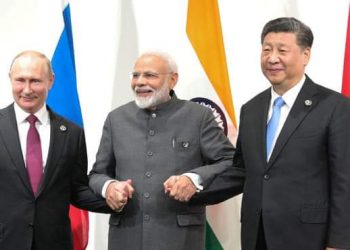Libya today has become quite a persistent headache for the world community, in general, and Europe, in particular. NATO is surely regretting bitterly it has not finished the work it started in 2011 to oust the dictator Qhaddafi. The help extended generously to the revoutionaries, then, by NATO certainly destroyed the Qhaddafi system, but with it went, to date, the Libyan state. Today it is merely a collection of city-states, or worse tribe-states motivated by rentier privileges oil offers and religious extremism.
Alas, today Libya is a non-state to be added to the growing list of Arab failed states resulting from the destructive chaos of the Arab Spring. Libya could have simply gone into limbo like Somalia, at some point, if it had remained docile and quiet and the world would have gladly forgotten about it. But, it has not because it has gone awry and it has become a threat to its neighbours north and south.

The Libyan migration hell gate to Fortress Europe
For the lat two years, welcoming and friendly Italy has been patiently bearing alone the brunt of an African migration invasion originating from the Libyan shores. This migration, had it been in a trickle fashion could have gone almost unnoticed by other European nations as their dynamic markets could have accommodated happily this cheap god-sent labor, but it turned dramatic as the number increased and thousands drowned in the Meditrranean Sea.
Alarmed by this human tragedy, that could ultimately go crescendo if unchecked, humanitarian European NGOs called for immediate action. Some suggested flatly to welcome the migrants on the European soil. Under pressure, the European heads of states met to find an acceptable solution. Of course nobody expected Europe to open the gate for mass migration, because such a thing is synonymous of economic suicide for a continent that is hardly recovering from a severe recession.
Instead, Europe has made public its willingness to help the migrant boats in the Mediterranean and set up migrant quotas for member states, a decision that was rejected right away by some member countries. This means quite clearly that this thorny issue will certainly not be easy to solve within the European Union, in the short term.
The question, then, is what to do to solve this problem, in the long term ? Actually, two possibilities arise at this point :
-
Search for and arrest those responsible for the recruitment of migrants and the organization of the practise into a lucrative business and indict them in European courts with manslaughter charges. This is not an easy task, but if countries in the north of the Mediterranean would seek the help of the countries in the south of the Mediterranen, for that purpose, it could be achieved ;
-
Invade Libya to help set up a democratic government instead of the actual myriad powerless city-states. However, this option is not easy and migh be risky for Europe in case the Islamists decide to call for Jihad against the « Christian » invaders. This could easily turn into a quagmire and might threaten the stability of both Italy and tiny Malta and create an area of instability for commercial ships in the Mediterranean. Also, if Libya is to be invaded, who will do the invasion : the European countries themselves or the NATO and in this case what would be the reaction of Russia ?
For sure, the sitution in Libya cannot be allowed to remain as it is, for more the status quo perdures, more the risk of proliferation of extremist groups on the Libyan soil will increase and the temptation for the Libyan Islamists to join forces with other extremist group. Indeed, lately ISIS has conducted highly-publicized collective summary executions of religious and ethnic groups. The presence of ISIS on Libyan soil can also threaten other North African states as well as Europe.
Present Libya is a threat to stabilty in North Africa and in the Sub-Saharan region
In the long run, instability in Libya could be a lethal threat to the nascent democracy in Tunisia where the Islamists would feel emboldened to destabilze the existing government further, especially after the recent unfortunate terrorist attack on the Bardo Museum on March 18, 2015, which was directed at crippling the tourist industry, the economic lifeline of the country.
Tunisia has painstakingly adopted a very progressive constitution that enshrines women rights and democratic values and sets the groundwork for a long term democracy. So far, Tunisia is the only Arab Spring country that has gone democratic rather than going the way of instability and chaos. Therefore, it has to be nurtured and protected to serve as a role model for other Arab countries in the future.
A chaotic and Islamist Libya could embolden the various terrorist groups in the Sub-Saharan region to create a crescent of terrorism and instability all the way from Somalia in the Horn of Africa to Senegal on the Atlantic Ocean shore, and become a fertile ground for the rise of Islamist governments in this vulnerable area.
So stabilizing Libya would be tantamount to cutting the grass under the feet of the Islamists, who dream of the establishment of an Islamic Caliphate in the Sub-Sahara region.
Bringing back the monarchy to Libya is the solution
Libya, today, is split between an Islamist rule in the west and the south and a secular power in the east. The two blocks have failed militarily to neutralize each other and have also failed to reach a compromise in the recent UN-conducted negotiations in the city of Skhirate in Morocco. So, all the classical avenues for conflict resolution have been explored to no avail.
Short of an external invasion, the only solution possible today is an internationally-guaranteed package to bring back the Senussi monoarchy to reign and have a limited rule, as a referee power, and guarantee, as it were, a democratic system.
A national conference could be held anew in Morocco, to officially enthrone the descendant of the Senussi dynasty and negotiate a constitutional monarchy status for the country, with a new constitution to be presented to the people for a referendum. If accepted, then the monarchy could be restored with the mandate to, firstly, nominate a national union government that would put together a national army and a police force and, then, organize legislative elections within two years time.
Mohamed Chtatou
Visiting Professor
© RIPRODUZIONE RISERVATA


















